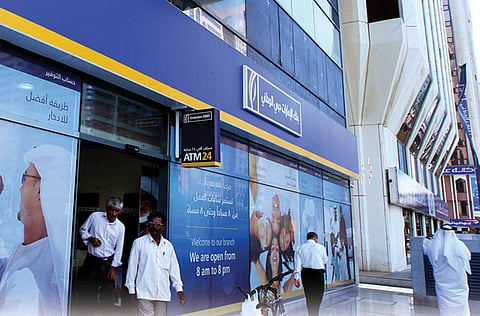UAE banks gradually improving
Most leading banks missed analysts' estimates on key performance indicators

Dubai: Nothing seems to have changed dramatically for UAE banks in the first quarter of 2011 except gradual improvement in liquidity, capitalisation levels and reduction in provisioning for bad loans.
Most leading banks in the country missed anal-ysts' estimates on key performance indicators such as profits, provisions and loan growth. Loan growth in 2010 was 4.4 per cent and going by the first quarter trend both bankers and analysts expect it to remain soft for the rest of the year.
Emirates NBD, the UAE's biggest bank by assets, reported a 27 per cent increase in its first quarter profits helped by gains from the sale of a 49 per cent stake in Network International, its credit card processing unit, which resulted in a gain of Dh1.8 billion.
"There are clear signs that the decline in margins witnessed through 2010 has been arrested and we have made significant progress in de-risking the balance sheet," said Rick Pudner, chief executive of Emirates NBD.
The bank's customer loans were down one per cent at Dh194.4 billion from Dh197.1 billion at the end of 2010, customer deposits were up 6 per cent at Dh212 billion from Dh200 billion at the previous year-end.
Lacklustre performance
"Net interest income exhibited lacklustre performance while non-interest income fell 26 per cent year on year driven largely by lower capital gains from securities and absence of income from Network International sale," said Naveed Ahmad, Senior Financial Analyst with Global Investment House. For the majority of banks, their exposure to bad debts in real estate continues to remain a problem. While valuations of these assets continue to remain depressed, banks are forced to make provisions. Loan growth in general is restrained by slow recovery in the economy and the new lending regulations by the Central Bank restricted the size and tenure of retail loans.
"We expect loan growth rates to remain in single digits. This does not mean that individual banks might not grow at a higher rate, but to do so, they will have to steal market share from competitors which requires superior value proposition as well as sales power and service quality," said Dr Reinhold Leichtfuss, Senior Partner and Managing Director at Boston Consulting Group (BCG) Middle East and head of BCG's Financial Institutions business in the Middle East.
National Bank of Abu Dhabi (NBAD), the UAE's second-biggest bank by assets, reported a net profit of Dh927 million for the first quarter of 2011, down 10 per cent from the corresponding quarter in 2010.
The latest result missed most analysts' expectations.
Although the bank's total assets grew 16 per cent year-on-year to Dh233.5 billion, overall lending rose just 4.7 per cent to Dh143.2 billion from December, while deposits increased 14.6 per cent to Dh141.1 billion.
"NBAD's outstanding loans moved up 7.2 per cent year on year. Customer deposits moved up a sharp 23 per cent, and as a result the loan-to-deposit ratio fell to 101 per cent from 114 per cent year end 2010," said Jaap Meijer, head of the bank team, AlembicHC.
Abu Dhabi Commercial Bank's (ADCB) first quarter net profit more than doubled, helped by lower bad loan provisions and a rise in non-interest income. The bank reported 3 per cent loan growth to Dh126 billion in March compared to the first quarter of 2010. Total customer deposits also grew 3 per cent Dh109 billion during the same period with the bank's loans to deposit ratio at 111 per cent.
Analysts said among the banks, ADCB's result was a positive surprise.
"Profits that were noticeably higher than our expectations. Results were driven by an across the board improvement in revenue streams," said Ahmad of Global Investment House.
Although some of the smaller banks such as Commercial Bank of Dubai and Mashreq maintained healthy profits in the first quarter of 2011 they too reported meagre loan growth.
While CBD's deposits increased by 5.4 per cent to Dh30.8 billion in the first quarter, its loans and advances decreased by one per cent year on year.



